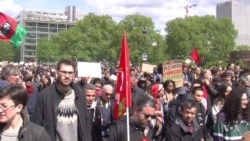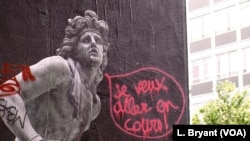Alain Bouhana surveiled the sea of May Day protesters crossing the Austerlitz Bridge on a blustery afternoon. The banners were back and the mood was upbeat, although moments later, it would be destroyed by black-hooded anarchists. But something was missing for 69-year-old Bouhana, who describes himself as an old Trotskyite.
"The issues aren't the same," he said of similar marches a half-century ago. "We were more revolutionary then, we wanted real change. Now, we mostly want to earn more and live decently."
Graffiti again covers university buildings. Workers are back on the streets, venting their grievances over reforms being pushed through by the year-old centrist government of President Emmanuel Macron. But May 2018 is a very long way from May 1968, an epic period of social turmoil in France that reflected broader international movements and left an indelible mark on this country's society, culture and politics.
"At its heart, May '68 was a revolt against authority and very frozen social hierarchies," said French historian and political scientist Nicole Bacharan. "It was about youth, about sexual freedom, about political rights, music, and creativity."
Analysts and protesters believe today's upheaval carries few of the same aims in an era of worries over the economy, globalization and climate change. The unity seen on the streets 50 years ago is also absent.
"It's not about changing the world," Bacharan said of current demands. "It's about security and protection."
But the unrest is unlikely to end anytime soon. Rail workers are carrying out rolling strikes against a massive overhaul of the country's state-run SNCF railway. In western France, anti-capitalist squatters continue to stage often-violent confrontations with police at the site of an abandoned airport project. Health workers, teachers and pensioners are on the streets, worried government measures will strip away their benefits.
Barricades at Nanterre University
At Nanterre University outside Paris, where the May '68 protests first started over demands for co-educational dormitories, university students are barricading buildings, echoing anger now rippling across other higher education establishments over government plans to overhaul the university admissions system.
"The conditions are similar to '68. We're asking for emancipation and more rights for everyone, and better-quality education," said Nanterre's Communist Student Union head Manel Djadoun. "The context is different; we're not in a situation of a general, nationwide strike. But we hope the situation will change, and become even bigger than May '68."
The 1968 protests took place during a broadly upbeat period in France. The economy was strong and unemployment was low. Yet trade unions were also strong - as were social traditions. The protests soon spread from universities to factories, as workers demanded better pay. At one point, nearly a million people marched in Paris streets.
The French protests fit into a global context of popular revolt among the world's young people. Students took to the streets of Europe and Mexico City, where soldiers opened fire on hundreds of protesters in a crackdown preceding the 1968 Olympics. Americans were marching for civil rights and against the Vietnam war, "which had a very strong resonance in France," historian Bacharan said.
At home, the government of then-president and wartime hero Charles de Gaulle teetered but recovered. He dissolved parliament, and his conservative party handily won legislative elections the following month. But de Gaulle resigned a year later, after losing a referendum.
Other changes came gradually. In 1974, the voting age was lowered from 21 to 18. A year later, France legalized abortion. Over time, sexual freedom, contraception and generalized higher education came to be considered givens.
"There is a kind of nostalgia about May '68 among people in their 20s today," historian Bacharan said. "There's the feeling the '60s and especially the '70s were more fun. That their parents' lives were better. That the music then was so great."
Grim backdrop
Not everyone remembers May '68 fondly, however. Jean Picollec was a young editor at the time, picking his way through the riots and sit-ins every morning as he headed to work.
"I was totally against them," said Picollec, who now owns his own publishing company. "The intellectual atmosphere was dangerous. The protesters were fervent Maoists" supporting leftist powers in the Soviet Union and Asia that turned out to be deeply repressive.
He mocks expressions crafted in 1968 — such as "It's forbidden to forbid" — that still remain in French lexicon.
"Everyone did everything and it went overboard," Picollec said. "They burned people's cars, it was destroying just to destroy. A society without rules can't live."
The ugly underbelly of May '68 remains in today's unrest, as hundreds of May Day rioters torched cars and destroyed shop windows in Paris. But the broader backdrop is also more grim, as unemployment hovers at nine percent and growth is only recently inching up after stagnating for years.
There are other key differences. Half-a-century ago, grandfatherly de Gaulle symbolized the past young revolutionaries were turning the page on. By contrast, 40-year-old Macron is today's generation; a man who casts himself as a reformer, and who was not even born until nearly a decade after the '68 protests.
But polls show French are deeply divided over his reforms. While many support the railway overhaul, they are against other labor market measures, and the president's popularity has nosedived in recent months.
2018 has yet to find the unity and resonance of its '68 muse. The French left is in tatters after last year's election and union response is fragmented. Instead of joining forces in May Day protests, for example, rail syndicates marched separately.
"They'll try to capitalize on 50 years ago," said analyst Bacharan, "but it's a very different world."









